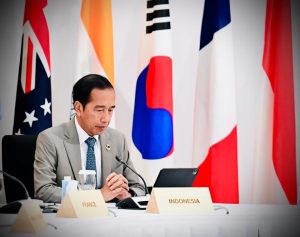During the sixth session of the G-7 Summit in Hiroshima, Japan, on May 21, Indonesian President Joko “Jokowi” Widodo underscored the right of every country to development, which must be respected. As part of that, countries of the Global South should be allowed to export more than just raw materials, moving away from the practices of the colonial era.
While Indonesia is gradually reducing its reliance on raw material exports, it remains open to fair and mutually beneficial cooperation in other forms. Jokowi hoped that the G-7 countries could become partners in Indonesia’s downstream industry.
Indeed, Indonesia has been striving toward downstream industrialization by banning exports and requiring domestic processing of certain raw materials, starting with nickel ore. The policy was disputed by the European Union. Besides France, Germany, and Italy as EU member states, the other G-7 countries (Canada, Japan, the United Kingdom, and the United States) are among 15 third parties supporting the EU in its suit.
Last year, the World Trade Organization (WTO) ruled that Indonesia’s export ban and domestic processing requirement violated multilateral trade agreements. Subsequently, Indonesia appealed the ruling to the WTO Appellate Body. Meanwhile, Jokowi announced Indonesia’s plan to ban exports of other raw materials such as tin, bauxite, and copper.
Through export bans and domestic processing obligations, Indonesia under the Jokowi regime seems to be rejuvenating the “dependency theory” that emerged in the 1950s and 1960s. Pioneered by Argentine economist Raúl Prebisch, the theory studied underdevelopment by emphasizing how constraints imposed by the global political and economic system initiated resources flows from poorer to wealthier countries.
Prebisch’s work, “The Economic Development of Latin America and its Principal Problems,” explored how Latin America’s economic development was hindered by its dependence on primary commodity exports, which were vulnerable to price fluctuations. He advised Latin American countries to industrialize and diversify their economies to reduce dependency and promote growth.
The theory assumes that underdevelopment stems from the peripheral position of Global South countries within the global system, predominantly created by the “center countries” in the Global North. The countries classified as the “periphery” employed unskilled labor and supplied raw materials to the countries at the “center” to facilitate the production of higher value-added goods. Such a system resulted in Global South’s reliance on the Global North, creating a structural imbalance that perpetuates underdevelopment of the former while enriching the latter.
The theory presented empirical evidence from the Latin American region to validate its assumption of periphery-center dichotomy. Conversely, in the 1980s, some countries in Asia, such as South Korea, Taiwan, Hong Kong, and Singapore, were able to break free from the dichotomy and transformed themselves into newly industrialized countries. They succeeded by leveraging skilled labor and entrepreneurship in the absence of abundant natural resources.
Since then, the relevance of dependency theory has been fading away with the wave of globalization. Periphery countries have greater access to foreign capital, technology transfer, and participation in global value chains, which can potentially help them escape the cycle of dependency.
While globalization has challenged the core assumptions of dependency theory, certain aspects of the theory are still useful in understanding global inequalities and the dynamics between developed and developing countries. In particular, the theory remains relevant for the development trajectory of natural resource-rich countries like Indonesia.
The theory suggests that underdeveloped countries rich in natural resources can become trapped in a cycle of exporting low-value raw materials. They face challenges in accumulating capital and investing in industrialization due to the low revenues generated from raw materials exports, leading to persistent underdevelopment.
From 1950 to 2020, Indonesia heavily relied on low-value-added commodities exports, including raw minerals. It made the country vulnerable to price fluctuations in the global market and prevented Indonesia’s economy from unlocking its potential for better growth. The reliance on natural resources constrained the country’s ability to advance up the value chains and industrialize, trapping Indonesia in persistent underdevelopment.
Jokowi’s remarks at the G-7 Summit align to a certain extent with the principles espoused by dependency theory. He referred to the Global South and emphasized the right to development and the need to add value to natural resources, echoing the core tenets of dependency theory.
Jokowi addressed Indonesia’s persistent underdevelopment by rejecting the obsolete model of relying heavily on raw material exports and shifting to exporting higher value-added mineral products. To that end, he underlined the importance of fair and mutually beneficial cooperation, which echoes the theory’s critique of unequal exchanges.
To address the structural imbalances described by the dependency theory, Jokowi invited G-7 countries to become development partners and bring capital to invest in Indonesia’s downstream industry. Yet those Global North countries might still be cautious about responding to the invitation if Indonesia insists on a policy disrupting global value chains. This is a vicious circle in rejuvenating dependency theory.

































